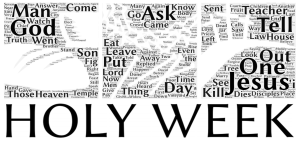 Mark 14:53-64
Mark 14:53-64
Do you know how olive oil is made? It’s not just a matter of squeezing an olive; the process needed to extract the valuable oil is extensive. First, the olives are crushed. Traditionally, a large press is used to grind the olives into a paste, and then the paste stays under pressure for a length of time. Next, the paste is spun in a centrifuge, which adds even more pressure to the crushed olives. This separates the oil from the water contained in the olive itself.
When I consider what pressure Jesus voluntarily placed Himself under as He headed for the Cross, I am stunned. Jesus gives himself over to those whom He knows will place Him under pressure unlike what He has ever experienced. In Mark 14:43-52, we see Jesus being taken into custody. Unlike many people who have been held for trial (a very stressful time), Jesus does not overcome through strength; rather, He allows the process to happen because of the agreement with God the Father in the garden of the olive press. The parallel is too poignant to pass up: Jesus knows He’s going to be pressed, and yet He does not give a defense.
In fact, in verses 53-65, we see that Jesus is put through an illegal trial. This kangaroo court contrived by the Jewish leaders was in violation of Jewish law and culture. Nevertheless, Jesus allows it to continue. When accused of being the Christ in verse 61, He admits the unpopular truth.
The leaders can’t stand to hear Jesus’ reply, “I am,” said Jesus. “And you will see the Son of Man sitting at the right hand of the Mighty One and coming on the clouds of heaven.” Notice the leader’s response: they rend their clothes, shout accusations, and condemn Jesus.
Consider this: if anyone else had said the same thing, the high priest would have been right. But the priest was so focused on his own role that he was unable to consider that Jesus was telling the truth. When we face pressure, are we willing to be crushed so that the truth would be made known? Or would we rather hold a position that doesn’t consider any other view except that which we already believe to be true?
Lord, as we enter Good Friday, please help us remember that the very existence of pressure doesn’t mean that we’re wrong. It also doesn’t automatically mean we’re right, either. It may just be the circumstances that You’re allowing to let Your glory and Your work be seen. Help us to look to You, no matter what we’re experiencing. We ask it in Jesus’ name. Amen.